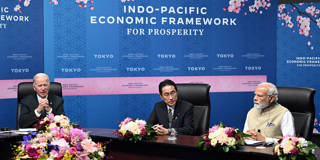US President Joe Biden recently launched the Indo-Pacific Economic Framework for Prosperity, a new grouping aimed at ensuring that China does not gain economic leadership of the region. But unless America is willing to provide greater access to its domestic market, Biden’s effort is unlikely to succeed.
TOKYO – In May, US President Joe Biden visited South Korea and Japan with the aim of reaffirming America’s commitment to the Asia-Pacific region after the uncertainties and doubts generated by Donald Trump’s presidency. In Tokyo, Biden launched the Indo-Pacific Economic Framework for Prosperity (IPEF) and participated in a summit of the Quad, an informal security grouping that also includes Japan, Australia, and India.
The Quad aims to promote and secure a free, open, prosperous, and inclusive Indo-Pacific region, and is widely regarded as a means of checking China’s regional ambitions. But the IPEF’s benefits are less obvious to many Asian countries.
Besides the United States, the IPEF’s initial signatories are Japan, South Korea, India, Australia, New Zealand, and seven member states of the Association of Southeast Asian Nations (ASEAN): Brunei, Indonesia, Malaysia, the Philippines, Singapore, Thailand, and Vietnam. The new grouping supposedly intends to set common rules regarding the digital economy, implement strong trade-related labor and environmental standards, share information on supply chains of semiconductors and other sensitive products, and support the construction of clean-energy infrastructure.

TOKYO – In May, US President Joe Biden visited South Korea and Japan with the aim of reaffirming America’s commitment to the Asia-Pacific region after the uncertainties and doubts generated by Donald Trump’s presidency. In Tokyo, Biden launched the Indo-Pacific Economic Framework for Prosperity (IPEF) and participated in a summit of the Quad, an informal security grouping that also includes Japan, Australia, and India.
The Quad aims to promote and secure a free, open, prosperous, and inclusive Indo-Pacific region, and is widely regarded as a means of checking China’s regional ambitions. But the IPEF’s benefits are less obvious to many Asian countries.
Besides the United States, the IPEF’s initial signatories are Japan, South Korea, India, Australia, New Zealand, and seven member states of the Association of Southeast Asian Nations (ASEAN): Brunei, Indonesia, Malaysia, the Philippines, Singapore, Thailand, and Vietnam. The new grouping supposedly intends to set common rules regarding the digital economy, implement strong trade-related labor and environmental standards, share information on supply chains of semiconductors and other sensitive products, and support the construction of clean-energy infrastructure.